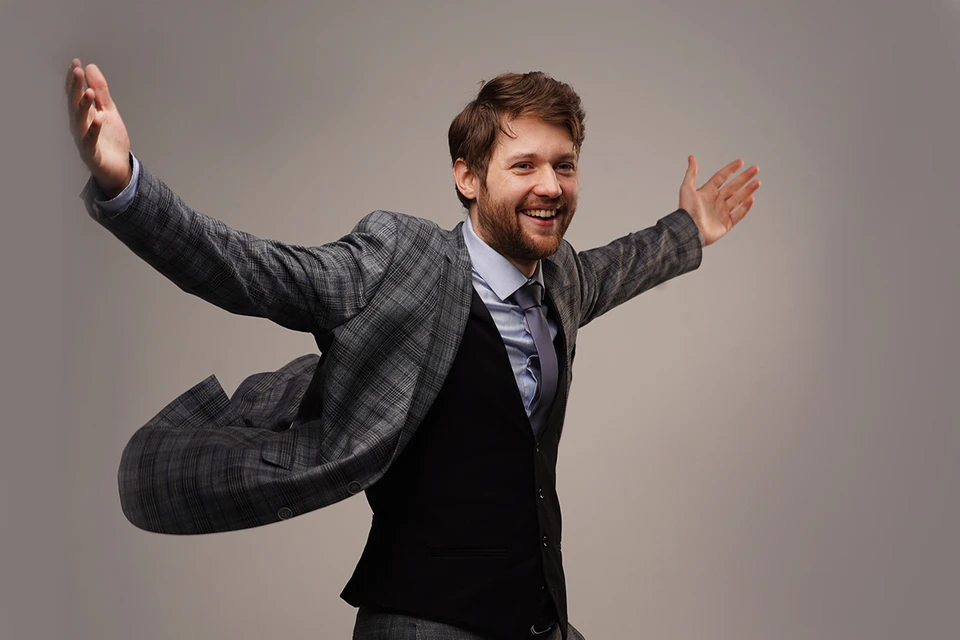The mystery of the Sun’s corona

- When did you get the desire to do science?
I’ve wanted to do something like this since I was a child. I was about five or six years old when I watched the program “Walking with Dinosaurs”, which impressed me very much. I got a paint brush, a small shovel, and my brother offered to take me to the local meat processing plant so that I could dig up bones of cows to have been buried nearby. I set about trying the idea, but he never kept his promise, and I did not become a paleontologist.
My parents were engineers, so something technical, the image of a creative person attracted me. Having graduated from school, I entered Aerospace University, for studying physics and mathematics.
- What is the essence of your job now?
There are great scientists like Einstein, Newton, who paint a picture with large strokes. And we, the rest of the scientists, make it more detailed and clearer.
To summarize, I am engaged in heliophysics. This subject is interesting for several reasons. The first one is philosophical. The Sun is the source of life on the Earth, the “sponsor” of everything to be happening here. All energy, except geothermal and atomic, is converted solar energy. Moreover, when studying the Sun, we do a kind of research of other stars as a whole, because it is closer, and we can observe smaller processes in detail.
The research team, which I work in, is engaged in exploring waves in the upper layers of the solar atmosphere. This is fundamental scientific work that adds details to our understanding of nature. I hope our research will one day help unravel why the Sun’s corona is much hotter than its other layers — photosphere and chromosphere. Its temperature is a million degrees, and the temperature of the layers beneath it is just 10 thousand degrees. It turns out that at first it’s cold and cold, and then it abruptly gets very hot, and that’s unclear why. Scientists have been struggling with this mystery for 70 years, this is the holy grail of heliophysics. In practical terms, outcomes of exploring waves in hot plasma can be applied in the field of generating electricity through controlled thermonuclear fusion.
Besides, the most powerful events in the Solar system occur in the Sun’s corona: solar flares, coronal mass ejections. By its energy, it is like explosion of millions of nuclear bombs. These phenomena cause geomagnetic storms, “shake” the magnetic field of the Earth; because of them, satellites can go out of their orbits, radio communication can be broken. The more we learn about their nature and features, the better we will be able to predict and respond to them.
A scientist’s working day is like an office one
- Why did you choose the Sun for researching?
It turned out that way. At first, I got into this field due to my scientific supervisor, and then I’ve got involved. I was lucky to meet interesting people related to the subject. And all in all, it’s beautiful! Moreover, the Sun is always with us, everyone can feel it.
- What does a scientist’s working day look like?
It’s different for everyone and depends on whether you are an experimenter or a theorist. In the first case, you immediately run to the installation, in order to see what happens there, in the second case, the work is not much different from the day of an office employee. In the morning, you open your laptop, and make computations. For example, I often write formulas in the text editor. Then you do calculations, write code for this, and it’s similar to the work to be done by a software developer Then the stage of writing begins: you need to present the gained outcomes in articles.
So, the working day turns out to be irregular. You can get distracted for teaching or something else, so as you should work on weekends without ceasing. I’ve been used to working in the evenings since I was a student.
Everyone of us work in the research team, but all members of the team solve their own tasks. Then we hold seminars and discuss the outcomes.
You need to listen to the airspace
- Where do you get new ideas for your scientific work?
It is necessary to “listen to the airspace”, like the Japanese do. In our case, it means reading articles and communicating with colleagues. Curiosity and hypotheses for explaining some phenomenon help. Then you choose which idea you like best, which one seems the most reasonable, and consider it in detail.
Observing nature is also inspiring. Many physical systems obey similar laws, and have their own analogues. For example, I look at running water and imagine streams of red-hot plasma of the Sun. I watch a water wave, and think about features of waves in outer space.
- Have you noticed that you’ve got transformed in the area of your profession, with your perception having changed?
I can stick to some simple everyday task or process, imagining how everything works, how to solve it, how to describe it. Cutting bread, I can think that the knife consists of atoms that pass through the bread molecules, destroying bonds and so on.
Science is an ordinary job
- How do scientists differ from other people?
I promote the viewpoint that science is an ordinary job. Scientists are not more intelligent than an engineer or a plumber, we are just optimized for different tasks. Occupation seems to me not to greatly affect everyday routine, except for cases of rare geniuses with their heads in the clouds. Scientists can be even more rational when solving everyday problems. We can also get emotional: to my mind, it depends more on the person’s character, than their profession. There are also many enthusiastic people in science, which are passionate about their work and often devote most of their time to it. And, according to my observations, scientists are more like children, they are more spontaneous.
- What is the most unpleasant thing about scientific work?
Drafting reports on grants, and applications for them. This can take a lot of time, and it does not mean that you will receive funding. Some colleagues don’t even like to write articles, preferring to devise formulas.
- How do you respond to routine tasks?
It depends on the Moon’s phase. Irritation and frustration may happen, when you need especially a lot of things to do. Sometimes I manage to endure this calmly. Sometimes, on the contrary, I even happy to routine tasks, for instance, when the brain needs rest.
I like to cross items off the list
- How do you recover yourself when you get tired?
There are plenty of ways. The more hooks you throw, the more you expand your network, the easier it is to recharge. For example, music helps me restore my energy. If I manage to listen to something that awakens my desire to throw a stool out the window, then that’s even better. I can cook something delicious. Or watch an anime. Power can be also obtained out of work when you see its result, or out of an interesting article you’ve come across. I also dance: salsa, son, cha-cha-cha, lindy hop, and play several musical instruments. Now I have begun to master guitar and bass guitar more seriously, and this is akin to meditation: your entire attention is turned into the instrument, into the sound.
- Researching, a lot of hobbies… How do you manage your time?
As for my personal long-term affairs, I try to keep them in my head; and for scheduling at work, there is the CRM system. I sometimes write down my daily tasks on a piece of paper, because I like to cross them off: it’s a very pleasant feeling. Task trackers didn’t catch on with me.
- Do you do something special for strengthening your memory, and supporting yourself in the intellectual tonus?
The best remedy is physical activity. And you also need to get enough sleep. As they say, if you want the brain to work, do not forget about the body.
Science has made the world safe, but some people have already begun to fear science
- Is there anything you don’t like or are surprised by in people’s thinking?
It’s an exciting time we live in. People start forgetting that it was development of science that made our world safe, and they have already begun fearing its achievements. For example, someone is afraid of a vaccine, someone is afraid of GMOs.
I am tolerant in friendly communication. People differ, they are shaped for different things, and should be gently treated.
- Have you met any mistakes in science fiction films?
In one of the “Star Wars” episodes, one spacecraft bombed another, and shells fell downward, as we are used to it on the Earth. And it was quite funny, because in orbit, the shell would have been flying along with the spacecraft.
- How do you feel about popularization of science?
In my opinion, this is a good trend. I have participated in events of this format. I was giving a lecture, and my voluminous presentation did not open. I had to dance, showing the waves.
This trains oratorical skills and helps understand the subject better. As they say, the best way to learn something is to teach someone else. There is a chance to get unexpected questions that will kick you in the gut, and you are unlikely to answer right away, because you’ve never thought about it.
What happens if the Sun goes out
- What are people interested in lectures of this kind?
Once I was asked, for example, what would happen if a nuclear bomb was dropped on the sun or what would happen if it went out.
- And what will happen if the Sun goes out?
Nothing good. It will start turning into a red giant, collapsing, there will be helium flashes, and the Earth’s atmosphere is supposed to be blown away approximately at this moment. After all these fluctuations, the Sun will “take off” its outer shells, and in its place, a white dwarf star will remain, a dense object comparable in size to our planet, which will cool down for millions of years. Apparently, none of us will be able to live in this wonderful time.
- Please formulate your life philosophy in five theses.
As our philosophy teacher liked to tell, “If you are aware of doing philosophy in your life, then stop doing it.
If you encounter insurmountable problems of existential nature, you need to ask yourself the question: so what? Can I overcome this? No, I can’t. So what? Nothing. We live on.
To be honest with yourself and with other people is the main rule of communication.
You need to strive for results, but do not set super-tasks, do not exhaust yourself. Don’t feel sorry for yourself, but treat yourself gently.
Don’t put yourself on a pedestal. All professions are needed, all professions are important.
Source: samara.kp.ru
